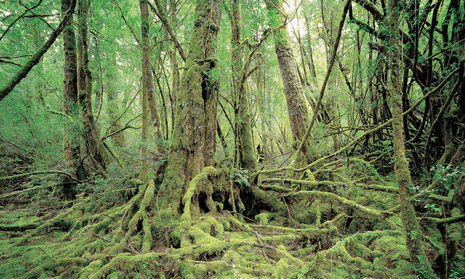The Tasmanian government is on course to pass legislation that would tear up the state’s forestry peace deal, with environmentalists claiming the move will open up 1.5m hectares of largely pristine forest to logging.
The state government’s forestry bill has already passed the lower house, which it controls, and is in the process of negotiating the legislative council, the upper house of parliament. Key independent Robert Armstrong has indicated support for the bill, meaning it is likely to pass.
The bill will remove 400,000ha of native forest from reserves set up by the Tasmanian Forest Agreement.
An additional 657,000ha in conservation areas and 454,000ha in regional reserves will also be opened up to “partial logging” for the speciality timber industry.
Green groups say that 1.5m hectares of forest, some of it pristine old growth rainforest that has been protected for 30 years, could potentially be felled.
The state government argues that the existing forestry agreement, which ended decades of battles between loggers and conservationists, is stifling jobs and investment in the timber industry.
Paul Harriss, Tasmania’s minister for resources, said he was “optimistic” the bill, which designates particular species of tree for logging, would pass.
“The bill rips up the job-destroying Tasmanian Forest Agreement and provides a framework to rebuild and future-proof the industry,” he said.
“The forestry bill does not provide for native forest timber harvesting in any existing reserves. Under current legislation the management objectives for regional reserves and purposes of reservation for regional reserves already explicitly provide for special species timber harvesting.”
Last week he set up a new ministerial advisory council made up entirely of timber industry and agriculture representatives, with no one from an environmental group.
The state government is also introducing tough new anti-protest laws, aimed primarily at anti-logging activists, dismissing claims they impinge upon the freedom of speech.
Environmental groups, which have conducted an advertising blitz attacking the new forestry bill, claim the Liberal government has gone beyond its election pledge to rip up the peace deal.
Jenny Weber, campaign manager at Bob Brown Foundation, said: “This is undoing 30 years of protection in some places. It’s going further than they ever said they would.
“What we are seeing here is a vast area of Tasmania’s land opened up to logging. There is this myth that specialist timber is environmentally sensitive. We are very concerned about the forestry roads, the burning after logging and the method of logging. It’s very destructive.”
Weber said the areas opened up to logging will include large areas of the Tarkine wilderness in the north-west of the state, as well as Bruny Island in the south. She added that threatened species such as the swift parrot, spotted tailed quoll, wedge tailed eagle and Tasmanian devil would all suffer from an expansion in logging.
“We have a very conservative government here in Tasmania, as in Australia, that is intent on attacking the environment,” she said. “We need to acknowledge that these forests are a scarce, valuable resource.”
In June, the United Nations rejected a bid, supported by both the Australian and Tasmanian governments, to strip 74,000ha of forest from the state’s world heritage area. The justification for the move was described as “feeble” by a member of the UN’s world heritage committee.







Comments (…)
Sign in or create your Guardian account to join the discussion